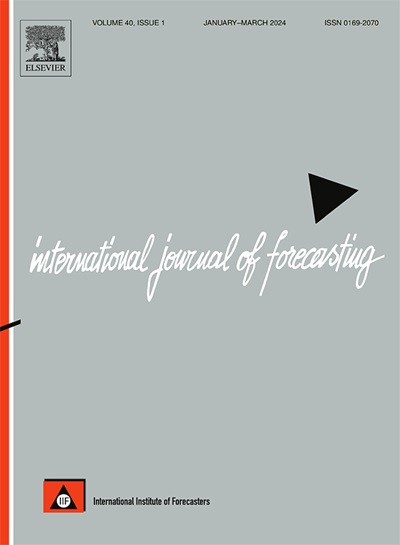An overview of the effects of algorithm use on judgmental biases affecting forecasting
IF 7.1
2区 经济学
Q1 ECONOMICS
引用次数: 0
Abstract
In the realm of forecasting, judgmental biases often hinder efficiency and accuracy. Algorithms present a promising avenue for decision makers to enhance their forecasting performance. In this overview, we scrutinized the occurrence of the most relevant judgmental biases affecting forecasting across 162 papers, drawing from four recent reviews and papers published in forecasting journals, specifically focusing on the use of algorithms. Thirty-three of the 162 papers (20.4%) at least briefly mentioned one of twelve judgmental biases affecting forecasting. Our comprehensive analysis suggests that algorithms can potentially mitigate the adverse impacts of biases inherent in human judgment related to forecasting. Furthermore, these algorithms can leverage biases as an advantage, enhancing forecast accuracy. Intriguing revelations have surfaced, focusing mainly on four biases. By providing timely, relevant, well-performing, and consistent algorithmic advice, people can be effectively influenced to improve their forecasts, considering anchoring, availability, inconsistency, and confirmation bias. The findings highlight the gaps in the current research landscape and provide recommendations for practitioners. They also lay the groundwork for future studies on utilizing algorithms (e.g., large language models) and overcoming judgmental biases to improve forecasting performance.
算法使用对影响预测的判断偏差的影响概述
在预测领域,判断偏差往往会阻碍效率和准确性。算法为决策者提供了一个有希望的途径来提高他们的预测性能。在这篇综述中,我们仔细审查了162篇论文中影响预测的最相关的判断偏差的发生,从最近的四篇评论和发表在预测期刊上的论文中提取,特别关注算法的使用。162篇论文中有33篇(20.4%)至少简要提到了影响预测的12种判断偏差中的一种。我们的综合分析表明,算法可以潜在地减轻与预测相关的人类判断中固有偏见的不利影响。此外,这些算法可以利用偏差作为一个优势,提高预测的准确性。有趣的爆料浮出水面,主要集中在四种偏见上。通过提供及时的、相关的、表现良好的和一致的算法建议,人们可以有效地影响他们的预测,考虑锚定、可用性、不一致性和确认偏差。研究结果突出了当前研究领域的差距,并为从业者提供了建议。他们还为未来利用算法(例如,大型语言模型)和克服判断偏差以提高预测性能的研究奠定了基础。
本文章由计算机程序翻译,如有差异,请以英文原文为准。
求助全文
约1分钟内获得全文
求助全文
来源期刊

International Journal of Forecasting
Multiple-
CiteScore
17.10
自引率
11.40%
发文量
189
审稿时长
77 days
期刊介绍:
The International Journal of Forecasting is a leading journal in its field that publishes high quality refereed papers. It aims to bridge the gap between theory and practice, making forecasting useful and relevant for decision and policy makers. The journal places strong emphasis on empirical studies, evaluation activities, implementation research, and improving the practice of forecasting. It welcomes various points of view and encourages debate to find solutions to field-related problems. The journal is the official publication of the International Institute of Forecasters (IIF) and is indexed in Sociological Abstracts, Journal of Economic Literature, Statistical Theory and Method Abstracts, INSPEC, Current Contents, UMI Data Courier, RePEc, Academic Journal Guide, CIS, IAOR, and Social Sciences Citation Index.
 求助内容:
求助内容: 应助结果提醒方式:
应助结果提醒方式:


